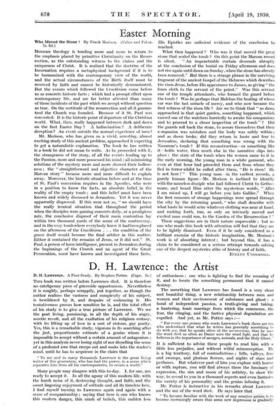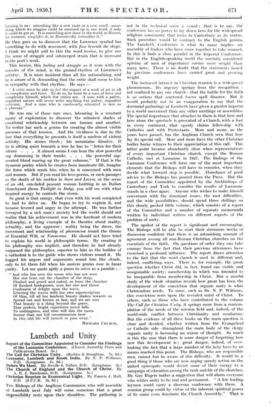D. H. Lawrence: the Artist
D. H. Lawrence. A First Study. By Stephen Potter. (Cape. 5s.) THIS book was written before Lawrence died. It is therefore no catchpenny piece of graveside opportunism. Nevertheless it is roughly, perhaps scrappily, put together, as though the author realizes the vastness and complexity of his subject, is bewildered by it, and despairs of embracing it. His tentativeness proves how sensitive he is, and the total effect of his study is to give a true picture of Lawrence. We see the poet living, passioning, in all the depth of his angry, ascetic revolt, and all the exaltation of his religious ecstasy, with its lifting up of love in a sort of riotous, gay purity. Yes, this is a remarkable study, vigorous in its searching after the just, proportionate estimate of a genius whom it is • impossible to accept without a certain amount of antagonism ; yet in this analysis never losing sight of nor dispelling the sense of a profound awe that creeps out and soaks into the reader's mind, until he has to acquiesce in the claim that "To me and to many thousands Lawrence is the great living writer of this generation who has had the power, in a sense which separates him from all his contemporaries, to create a world."
Many people may disagree with this to-day. I, for one, am ready to accept it. In all the agony of this modern life, with
the harsh noise of it, destroying thought, and faith, and the sweet lingering enjoyment of solitude and all its timeless love, I find myself turning to Lawrence again and again' with A sense of companionship ; saying that here is one who knows
this modern danger, this crash of beliefs, this sudden loss of enthusiasm ; one who is fighting to find the meaning of it, and to locate the something permanent that it cannot destroy.
The something that Lawrence has found is a very clean and beautiful thing, a new relationship between- men and women and their environment of substance and ghost : a
bond of independent passion, a truth-giving and taking, a bantering, tonic marriage from which the commerce, the fear, the clinging, and the furtive physical degradation arc expelled. And yet, as Mr. Potter says :—
"For every one person who reads Lawrence's book there are ten who understand that what he writes has generally something to do with 8er, that he speaks often of the unconscious, that he uses the word dark as often as Dante uses the word light, and that he believes in the importance of savages, animals, and the Holy Ghost."
It is sufficient to advise these people to read him with a little less prejudice, and without wilful misconception. He is a big territory, full of contradictions ; hills, valleys, fens and swamps, and glorious flowers, and nights of stars and perfumes. But whatever part of him you explore with horror or with rapture, you will find always there the luminary of expression, the 'sun and moon of his Artistry, to show the way, to reveal to you in a thousand aspects and even fantasies the variety of his personality and the genius infusing it.
. Mr. Potter is . instructive in his remarks about Lawrence and the use of the word dark. He Says later that
.
"To become familiar with the work of any creative artists is to become increasingly aware that some new impression is gradually forming in us : something like a new taste or a new smell—some- thing which we imagine could be summed up in one word, if only it could be got at. It is something new done to the world, as Heiner, for instance, simplifies it, or Dostoievsky intensifies it."
He then goes on to discover that the Lawrence symbol has something to do with movement, with flow beneath the shape.
I think we might add to this the word torsion, to give one the sense of struggle and submerged strain that is incessant in the poet's work.
This torsion, this feeling and struggle as it were with the muscles of the mind, is the ground-rhythm of Lawrence's
artistry. It is more insistent than all his rationalizing, and he is aware of it, demanding that the critic shall come to him in sympathy with that rhythm. He says
:- "A critic must be able to feel, the impact of a work of art in all its complexity and force. To do so, he must be a man of force and complexity himself, which few critics are. A man with a paltry, impudent nature will never write anything but paltry, impudent criticism. And a man who is emotionally educated is rare as a phoenix."
He was one of those rare ones, labouring in a constant agony of exploration to discover the minutest shades of
emotional relationship between one human and another. No writer has such a genius for creating the almost visible presence of that tension. And the vividness is due to the fact that everything he presents is itself a nucleus of violent activity. His stones throb ; his mountains dissolve. If he is 'sitting quiet beneath a tree he has to "listen for their silence . . . it almost seems I can hear the slow powerful sap drumming in their trunks . . . the powerful sap- scented blood roaring up the great columns." If that is the dynamic poetry which he creates from inanimate life, imagine the force which rends him when he is concerned with men and women. But if you read his love-poems, or such passages
as the death of his mother in Sons and Lovers, or the scene of an old, sun-faded peasant woman knitting in an Italian churchyard (from Twilight in Italy), you will see with what
inspired energy he controls the storm.
So great is that energy, that even with his work completed he had to drive on. He began to try to explain it, and became fevered and angry in the attempt. He was further betrayed by a sick man's anxiety lest the world should not
realize that his achievement was in the forefront of modem philosophy, a living example of its theories about reality, actuality, and the apparent ; reality being the dance, the movement and relationship of phenomena round the throne of Essential Will, or Noumenon. He should nct have tried
to explain his world in philosophic terms. By creating it his philosophy was implicit, and therefore he had already surpassed the philosopher, superior to him as the builder of a cathedral is to the guide who shows visitors round it. He hugged his angers and arguments round him like clouds, only to let them fall when his austere genius rose in lunar purity. Let me quote aptly a poem to serve as a parable :—
" And who has seen the moon who has not seen
Her rise from out the chamber of the deep, Flushed and grand and naked, as from the chamber Of finished bridegroom, seen her rise and throw Confession of delight upon the wave, Littering the waves with-her own superscription Of bliss, till all her lambent beauty shakes towards us Spread out and known at last, and we are sure
That beauty is a thing beyond the grave, That- perfect, bright experience never falls -
To nothingness, and time will dim the moon .
Sooner than our full. consummation here
In this odd life will tarnish or piss away."
RICII.A.RD CHURCH.











































 Previous page
Previous page